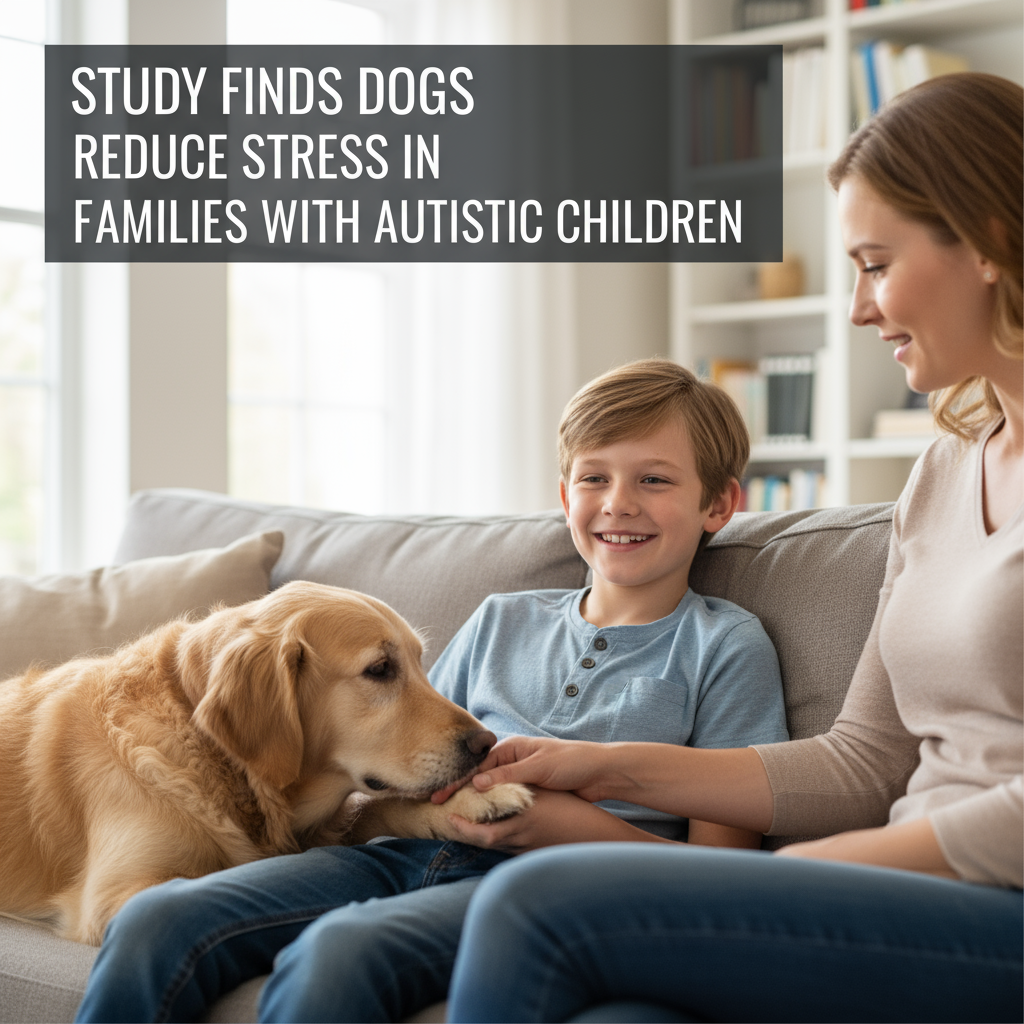Study Finds Dogs Reduce Stress in Families With Autistic Children
Estimated Reading Time: 5 minutes
- Pet dogs significantly reduce stress levels in families with autistic children.
- Improved family functioning and communication as a result of pet ownership.
- Strong attachment to pets correlates with lower parenting stress.
- The presence of dogs promotes emotional support for children with ASD.
- Careful consideration is needed when integrating a pet into family dynamics.
Table of Contents:
- The Science Behind Pets and Family Stress Reduction
- Key Findings from the Research
- The Unique Role of Pet Dogs
- Long-Term Benefits and Family Dynamics
- Limitations and Broader Implications
- Conclusion: The Impact of Pet Dogs on Families with Autistic Children
The Science Behind Pets and Family Stress Reduction
The results from a comprehensive follow-up study conducted for 2.5 years revealed an astonishing trend: families who integrated a pet dog into their lives reported consistent improvements in family functioning and noticeable declines in stress levels over time. These findings indicate that the presence of a dog creates a more harmonious home environment compared to families that do not own a dog.
One of the key elements of this study was the focus on primary caregivers, who experienced significant improvements in their own stress levels. Approximately 20% of these caregivers transitioned from clinically high to clinically normal stress levels after acquiring a dog, while families without a dog showed no such changes source.
Key Findings from the Research
- Improved Family Functioning: The research pointed out that families with a pet dog exhibited notably more harmonious interactions, coupled with fewer dysfunctional parent-child dynamics. Over time, these families reported improved communication and cooperation, fostering a supportive environment essential for families with children who have ASD source.
- Sustained Stress Reduction: Unlike typical interventions that may yield short-term benefits, the stress levels of parents in families with dogs continued to decline over multiple years instead of plateauing shortly after the pet was brought home source.
- Attachment Correlation: Strong attachment levels between parents and their dogs were directly correlated with lower parenting stress. This finding underscores the importance of not just pet ownership, but the emotional bond formed during the experience source.
- Overall Quality of Life: Families who owned dogs experienced a better overall quality of life, with increased feelings of normalcy and reductions in family tension, further highlighting the psychological benefits of pet ownership source.
The Unique Role of Pet Dogs
Interestingly, the benefits of pet dog ownership are not solely relegated to service or therapy dogs. Even ordinary pet dogs have been shown to contribute positively to family dynamics, promoting emotional support and easing anxiety. Studies have established that companion animals can provide crucial emotional and physical relief, especially beneficial for families with children diagnosed with autism source.
Additionally, research indicates that the mere presence of a dog can lead to lower levels of cortisol, a stress hormone, for children with autism, resulting in decreased anxiety-related behaviors source.
Long-Term Benefits and Family Dynamics
The implications of these findings point towards a clear conclusion: pet dogs can play a unique and lasting role in enhancing family harmony and reducing stress in households affected by autism. The process of integrating a dog into the family unit fosters stronger bonds not only between parents and children but also cultivates a sense of belonging and stability for children with ASD.
Moreover, it has been noted that the greatest benefits tend to manifest in families who exhibit a strong emotional attachment with their pet dog source. This underscores the importance of ensuring that the chosen pet is a good match for the family’s lifestyle and needs.
Limitations and Broader Implications
Despite the multitude of positive findings, it’s critical to recognize that these effects are not universally experienced by every family. Some studies indicate that not all areas of child and caregiver functioning show uniform benefits from pet ownership source. Families considering a pet should remain mindful of their unique dynamics and be prepared for both the joys and challenges of pet ownership.
Nonetheless, the overall consensus among researchers is firmly in support of the benefits dogs provide, especially in enhancing family dynamics and reducing everyday stress.
Conclusion: The Impact of Pet Dogs on Families with Autistic Children
In conclusion, the integration of a pet dog into families with autistic children clearly stands out as a compelling strategy for promoting better family functioning, reducing stress, and enhancing the quality of life. These findings are not only significant for families considering a pet but also for professionals in the fields of pet consulting and family therapy, emphasizing the importance of pet companionship in holistic care strategies.
For families facing the challenges associated with autism, embracing the companionship and unconditional love of a pet dog can lead to transformative changes, fostering healthier and happier environments.
For more pet care tips and guides, visit Pet Blog.
FAQ Section
Q: How do dogs help families with autistic children?
A: Dogs can reduce stress, improve family functioning, and provide emotional support which benefits families with children on the autism spectrum.
Q: What type of dog is best for families with autistic children?
A: The most suitable dog has to match the family’s lifestyle and needs, focusing on building a strong emotional bond.
Q: Are there any downsides to having a pet dog?
A: While many families benefit from pet ownership, not all will experience the same advantages—it’s essential to consider the unique family dynamics involved.
